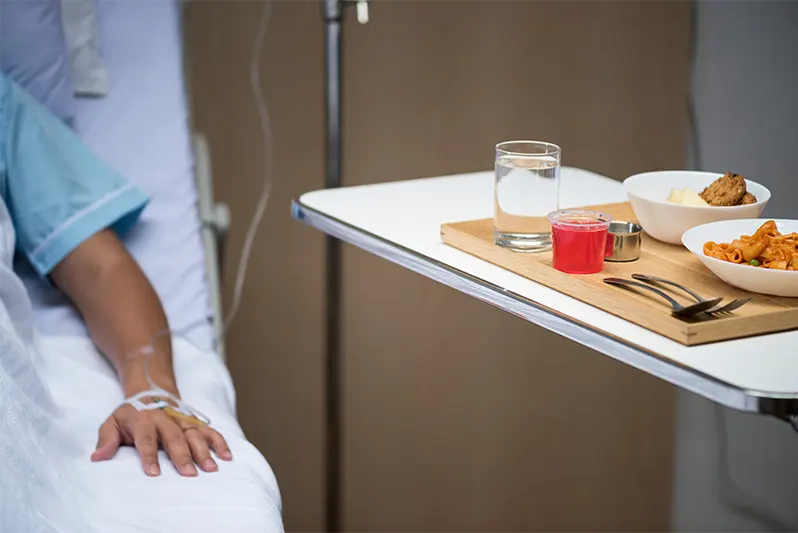When we think of hospitals, we often picture doctors, nurses, and cutting-edge medical technology. However, there's another critical aspect of healthcare that sometimes goes unnoticed but plays an equally vital role in patient recovery and the overall experience – quality food. Proper nutrition plays a significant role in a patient's recovery and well-being. Hospital food catering services are crucial in ensuring that patients receive the nourishment they need to heal and regain their strength.
Let’s explore the essential role of food catering services in hospitals, their challenges, innovations, and the impact they have on patient care.

The Significance of Hospital Food Catering Services
1. Nutrition as Medicine
Proper nutrition is the cornerstone of good health. In a hospital setting, it becomes even more critical. Patients often have specific dietary requirements due to their medical conditions. High-quality food catering services are essential in ensuring that patients receive the nourishment they need for their recovery.
2. Tailoring Menus to Medical Needs
Hospitals cater to a diverse patient population, each with unique dietary needs. Quality food catering service providers work closely with dietitians and healthcare providers to create customized menus. Whether a patient needs a low-sodium diet, a diabetic-friendly meal, or accommodations for food allergies, these services are equipped to provide the appropriate options.
3. Patient Satisfaction
Being in a hospital can be a challenging and stressful experience. High-quality and delicious meals can significantly improve the overall patient experience. Well-prepared and appetizing meals can significantly improve patient morale, making them more likely to comply with dietary recommendations.
4. Speeding up Recovery
Proper nutrition plays a direct role in the healing process. Patients who receive well-balanced and nutrient-rich meals are more likely to recover faster and experience fewer complications. This can result in shorter hospital stays and reduced healthcare costs.
5. Hygiene and Safety
Food Catering Service providers must maintain high standards of hygiene and safety in food preparation and handling. Food catering services in hospitals are trained to follow strict protocols to minimize the risk of foodborne illnesses, which can be particularly harmful to patients with compromised immune systems.
Challenges Faced by Hospital Food Catering Services
1. Dietary Complexity
The diverse medical conditions and dietary requirements of patients can be challenging for catering services. Food Service providers must develop menus that are not only nutritious but also appealing to a wide range of tastes and preferences.
2. Budget Constraints
Hospitals often operate on tight budgets, and food services must find ways to provide high-quality meals while remaining cost-effective. Balancing the need for nutritious food with budgetary constraints can be a constant challenge.
3. Food Supply Chain
Ensuring a consistent supply of fresh and safe food products is a priority for hospital food services. Managing supply chains, especially during times of crisis or shortages, can be demanding.
Innovations in Hospital Food Catering
1. Technology Integration
Many hospitals are adopting technology to streamline food ordering and delivery processes. Patients can now place orders through mobile apps or tabs, reducing errors and wait times. This also allows for better monitoring of patient dietary preferences and requirements.
2. Nutritional Analysis
Advancements in nutritional analysis tools help catering services provide more accurate information about the nutritional content of each meal. This is especially helpful for patients who need strict dietary control, such as those with diabetes or heart conditions.
3. Sustainable Practices
Some hospitals are taking a step further by adopting sustainable food practices. This includes sourcing locally grown and organic foods, reducing food waste through composting and recycling, and using energy-efficient cooking equipment. Such practices benefit not only the patients but also the environment.
Quality food catering services in hospitals are more than just a convenience; they are an essential part of patient care. Providing nutritious, appealing, and safe meals to patients not only aids in their recovery but also enhances their overall hospital experience. From tailored menus to technology integration and sustainability, these services are continually evolving to meet the diverse needs of patients and contribute to better healthcare outcomes. Ultimately, the impact of hospital food services extends beyond nourishment; it encompasses the overall well-being and satisfaction of patients, making their journey to recovery a more positive and successful one. FFS offers FSSAI-accredited supply chains and products, ensuring the highest standards of safety and quality.
